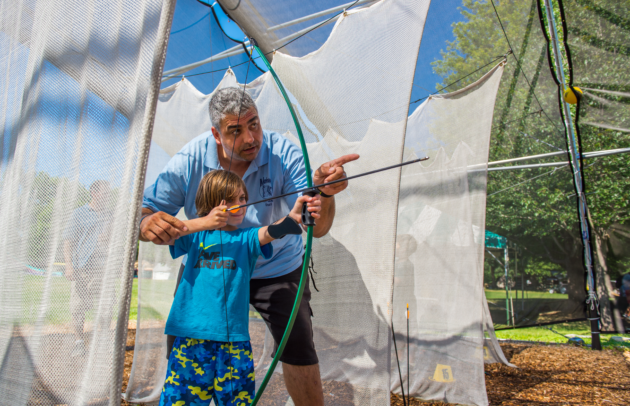
When considering camp for your child, there are a number of things to think about. For parents of children with special needs, there are additional considerations that need to go into making a camp decision. We spoke with two directors at special needs programs, Daniel Selmer, Director of Endeavor at Crestwood Country Day Camp on Long Island and Shep Baum, Director of Summit Camp & Travel in Pennsylvania to ask about some of the best ways for parents of special needs children to start thinking about camp for their child.
What would you say to a parent hesitant about sending their child with special needs to camp?
SB: Don’t hold your child back because you are nervous. As hard as it is for a parent, camp will allow your child to blossom and start to self-advocate which is what your child needs. Special needs children need to feel self-worth and self-esteem and to work on social skills like independence, friendship building and executive skills. Unfortunately, when family members are around, they enable their child by not allowing them to do things on their own, but at some point, you won’t be there and you have to prepare your child for life outside of the comforts of mom and dad. Camp does that in safe environment.
[gravityform id=”17″ title=”false” description=”false” ajax=”true”]
DS: All children can benefit from a change of environment and from being exposed to new experiences. Camp offers activities that children would never normally get to experience. A child who had not necessarily been successful in school, may thrive in camp. Camp has to have a complete and honest understanding of who your child is and the level of support he/she requires. In addition to fully understanding your child, camp must be prepared and have the appropriate tools to meet the child’s specific needs.
What’s the first thing a parent with a special need child should do when thinking about camp?
SB: Parents should keep in mind that just because a camp serves a special needs population, it doesn’t mean the camp is right for your child. Even if the population is the same, such as the camp serves children with autism, not all children are the same and not all programs are the same.
DS: It’s important to remember that special needs is a large umbrella statement to which there are many subsets. When thinking about camp, parents should think about the child they have at that moment in time. Parents should consider what they would like their child to take away from the camp experience, as well as what is achievable for their child at that time in his/her life. It is also important to remember that camp is different from school and the skill sets, while overlapping, are different.
What should parents of a special needs child be looking for in a camp?
DS: It’s important to remember that camp for the special needs population is not “one size fits all.” Parents should look for appropriate staff to child ratios, as well as experienced, professional adult staff that can provide the necessary and appropriate leadership for their child. You want to find out if the camp offers programs that target the child’s interests and has other like- minded campers enrolled. An appropriate camp should also be flexible and provide social and emotional training in real time, as well as opportunities to resolve conflicts as they arise. Parents should consider the track record and reputation of the camp in working with children similar to their own. The ability to successfully work with any given special needs population goes beyond the willingness to do so. Specialized programs must be run by experienced professionals who understand the depth and scope of each child’s needs and who are able to structure activities to help each child go outside of their comfort zone and be successful.
What’s the best way to look for a camp?
SB: Searching online is a great start. Also, going to your tribe around you, such as other special needs parents, neurologist, speech therapist or occupational therapist, are all good people to ask for recommendations. Once you find a camp that looks like it could be a good fit, don’t be afraid to ask the camp director a lot of questions and if the director is getting frustrated or upset, take that as a red flag. You also want to make sure the camp director wants to meet your child and asks a lot of questions about him or her. If the director doesn’t, that is another red flag. Asking the camp for a reference allows parents to find out about a camp’s reputation. Speaking with a parent who already has a child at the camp will allow you to understand certain things from a parent’s point of view.













